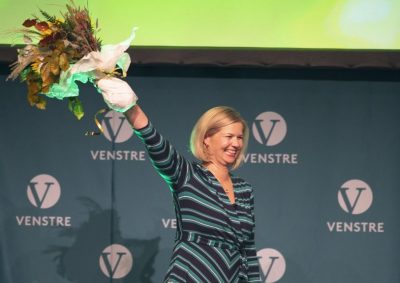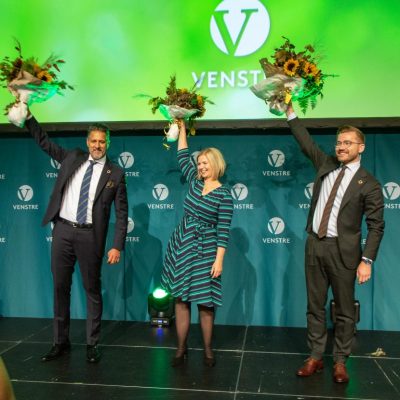Norway’s small Liberal Party (Venstre) has a new leader and a new agenda that has made it the country’s first to switch sides on the thorny issue of membership in the European Union (EU). The goal is to attract new voters, even though a majority of Norwegians still oppose EU membership.

Guri Melby was confirmed last weekend as the Liberals’ new leader, replacing party veteran and former government minister Trine Skei Grande. The party that ranks as Norway’s oldest, founded in 1884, has become a shadow of itself in recent years, claiming just 3.6 percent of the vote in the latest public opinion poll this week. That’s less than the 4 percent needed for full representation in Parliament.
The latest poll showed, however, a small increase over the 3.4 percent logged in the last poll, and the enthusiastic Melby seizes on any sign of growth. “The most important thing for Venstre now is to come over the 4 percent limit,” she told newspaper Klassekampen after her election as party leader. “And the goal, of course, is to become much, much larger than that.”

Latching on to the EU issue, and promoting EU membership, marks one of the biggest differences between Melby and her predecessor Grande. Few Norwegians would think it’s an issue that can help the party grow, but the 39-year-old Melby disagrees. She at least wants her generation to get a chance to vote in a new referendum on EU membership. Norwegian voters have voted it down twice before, in 1972 and 1994.
“The EU has been an incredibly important project to create peace and cooperation in Europe,” Melby notes, “and I think it’s only right for Norway to contribute.” Norway already goes along with most EU directives, as required through its trade agreement with the EU, and has adhered to the EU’s climate goals as well. Venstre has long been concerned with environmental and climate issues, “and for a party that views both as so important, it’s natural to join in on (cross-border) cooperation.”
Asked whether she thinks Norway will be a member of the EU 10 years from now, Melby responded that she hopes so. She acknowledged that the EU debate is “relatively dead right now, but I hope Venstre can blow some life into it.” She was encouraged that an overwhelming majority of party members voted in favour of the proposal to back EU membership at Venstre’s national meeting last weekend.
‘Left,’ but really ‘right’
Venstre means “left” in Norwegian, making the party’s name a misnomer 116 years after its founding. In 1884, when Norway was still in a forced union with Sweden, the party championed parliamentarism whereas the Conservatives (Høyre, meaning right) opposed it. That put the party on the left and determined its name at the time, only to become far more centrist with the rise of the Labour Party a few decades later.
Venstre has remained a centrist party over the years but joined Prime Minister Erna Solberg’s Conservatives-led government nearly three years ago and has turned more to the right than the left. Solberg’s Conservative Party is the only other political party in Norway to officially support EU membership as well, after internal disagreement led Labour to drop its own pro-EU stand and opt for taking no position at all in recent years. All of Norway’s other parties in Parliament oppose EU membership but most support the EU trade agreement (known as the EØS-avtale), even though it still leaves the country without a vote on EU measures that it must abide by.
Melby hopes for a new EU referendum later in the 2020s, but claims the “most important” thing is to protect the EØS-deal in the meantime. She and others fear it may be put into play, not least since the protectionist Center Party firmly opposes both the EU and the EØS deal and has recently gained voter support at other parties’ expense.
“The Center Party wants to scrap the whole deal and other parties are very critical of it,” Melby told Klassekampen. “I hope lifting the EU debate a bit will at least secure the EØS deal.” Prime Minister Solberg squashed an EU debate, however, not long after new support for the EU emerged last year, also in her own party’s youth group (Ung Høyre). Solberg didn’t think it was a good time to start a new EU debate, but now, at least, two of Norway’s three government coalition parties officially support EU membership. The third partner, the small Christian Democrats, opposes it.
Keen on another shade of green
Melby is also open to persuading the Greens Party (MDG) over to the non-socialist side. The Liberals and the Greens share many environmental and climate goals and both are firmly opposed to the oil industry. The Liberals also want to halt more oil exploration, claiming that oil is on its way out as a fossil fuel and carries much greater economic risk.
“We must be even more clear that the Oil Age is coming to a close,” Melby told Klassekampen and other media after her election. “We have to plan for that, and not keep putting it off all the time.” The Greens firmly agree, and have also expressed support for EU membership, largely because of the need to join pro-climate forces across borders.
The Greens, which cooperate with Labour in Oslo’s city government, are expected to do well in next year’s national election and thus play a pivotal role in the formation of a new government. “I have seen them as being part of the left-green side (of Norwegian politics), but at the same time I register that they’re steadily more critical to the Center Party (which cooperated with Labour and the Socialist Left in the last left-green government).” The Center Party is firmly anti-EU and pro-oil, and Melby cites Center’s “lack of environmental engagement” as a problem for the Greens: “They (the Greens) should perhaps re-evaluate their position in the landscape, and look in other directions.”
NewsInEnglish.no/Nina Berglund

